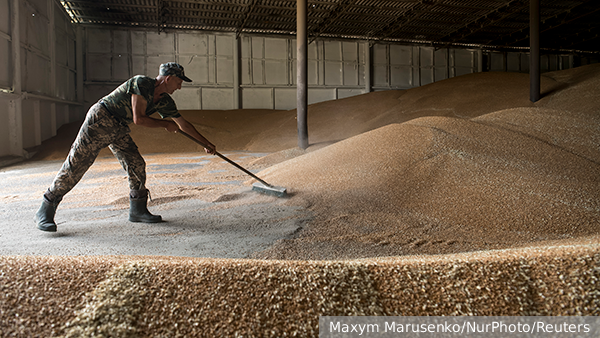
The grain issue causes problems between Ukraine and the EU members
By Rhod Mackenzie
The Ukrainian representative threw a tantrum at a meeting of Eastern European countries over the situation with Ukrainian grain. In Kiev, they believe that the Poles are deliberately preventing its transitusing the excuse of veterinary controlsand are outraged by the prospect of an extension of the grain embargo at an EU level. The relations between Ukraine and its European neighbours are developing in a way that favours Russia.
On Friday, the EU's temporary solution to the Ukrainian grain problem expires - a deal under which Brussels banned grain imports from Ukraine to some EU member states. It is an import, not a transit - Ukrainian grain is transported to foreign markets, but not to the nearest (and best) European ones. Kiev insists that it is time to lift this ban.
"There is no reason to maintain this ban... The import ban is fundamentally illegal. It violates the Association Agreement between Ukraine and the EU, as well as the principles and norms of the EU's internal market," said Oleg Nikolenko, a representative of the Ukrainian Foreign Ministry.
But some EU members have taken a different view. Slovakia, Hungary and Poland have said that if the EU does not extend the ban, they will do so at the local level of their national governments. Romania and Bulgaria are also leaning towards a similar solution. "We have agreed with my Romanian, Slovakian and Bulgarian colleagues that if there is no decision from Brussels to extend the current moratorium, we will take national measures on an individual basis," said Hungarian Agriculture Minister Istvan Nagy.
"If Europe does not extend the ban, we will be tough because it is in the interests of Polish farmers," says Polish Agriculture Minister Robert Telus.
The problem really lies with the farmers. The EU has an agricultural policy that sets very strict quotas on the amount that can be produced, so that there is no crisis of overproduction that causes price flucuations. The import of cheap Ukrainian grain (and on such a large scale) will bring prices down. And first of all in the countries through which it will enter the market, i.e. in the five Eastern European countries.
"They became alarmed because Ukrainian grain, being cheaper, began to displace their own grain from the market. Moreover, these are countries where agriculture accounts for a large share of GDP. Ukraine is depriving these countries of income and a stable market within the EU," Vadim Trukhachev, associate professor at the Russian State University for the Humanities, told the newspaper VZGLYAD.
The Poles are particularly active. "Poland will not itself to be flooded with Ukrainian grain. Regardless of the decision of officials in Brussels, we will not open the borders," said Polish Prime Minister Mateusz Morawiecki.
